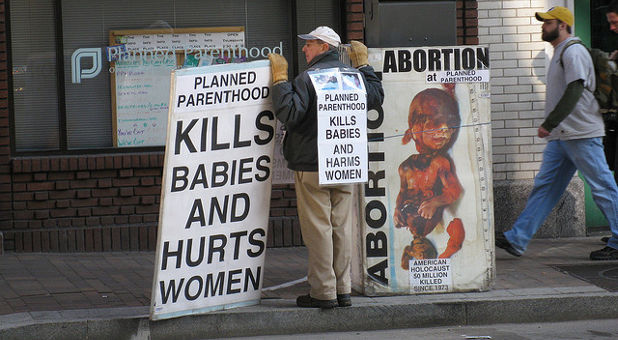US Supreme Court Takes Up Controversial Abortion Protest Case
The U.S. Supreme Court on Wednesday will wade into a divisive case that pits the free speech rights of anti-abortion protesters against public safety concerns raised by women’s health care providers.
The nine justices will hear a one-hour argument over a challenge to a Massachusetts law aimed at ensuring access for patients at clinics that offer abortions.
Anti-abortion protesters challenged the law, saying it violated their freedom of speech rights under the First Amendment of the U.S. Constitution by preventing them from standing on the sidewalk and speaking to those entering clinics. The protesters say their main aim is to counsel women in an effort to deter them from having abortions.
The 2007 law, which amended an existing statute, restricted conduct outside abortion clinics by introducing a 35-foot (11-meter) no-entry zone that allowed only patients, staff, passersby and emergency services to enter.
The law was enacted in part because of safety concerns highlighted by violent acts committed against abortion providers in the past. In 1994, two abortion clinic workers were killed outside a clinic in Brookline, Mass.
The case specifically concerns people who want to protest outside three Planned Parenthood facilities that offer abortions in addition to other health services for women in Boston, Springfield and Worcester.
The protesters have urged the Supreme Court to consider overturning its 2000 decision, Hill v. Colorado, that upheld a similar law in Colorado.
Steven Aden, an attorney at the Alliance Defending Freedom, a conservative Christian group that backs the protesters, said the state was targeting people for expressing a particular view.
“This case is about whether a government has the constitutional ability to cordon off a large section of public space and make it a First Amendment-free zone,” he said.
Lawyers for the state of Massachusetts say the law was enacted to deal with a potential public safety problem.
Martha “Marty” Walz, who heads the Planned Parenthood operation in Massachusetts, helped pass the law in her former role as a state legislator.
She said in a call with reporters last week that the law was carefully drafted not just to ensure safety of patients but also to protect the First Amendment rights of protesters.
The law “applies equally to everyone” and does not prevent protests from taking place, she said.
Just having the buffer makes a big difference because previously protesters would block the way, right up to the doorway, and would shout in people’s faces from close proximity, she said.
Two other states, Montana and Colorado, have similar laws. Municipal ordinances and court injunctions have also been used in various states to create similar buffer zones.
A ruling is expected by the end of June. The case is McCullen v. Coakley, U.S. Supreme Court, No. 12-1168.
Reporting by Lawrence Hurley; Editing by Will Dunham and Douglas Royalty
© 2013 Thomson Reuters. All rights reserved.















































